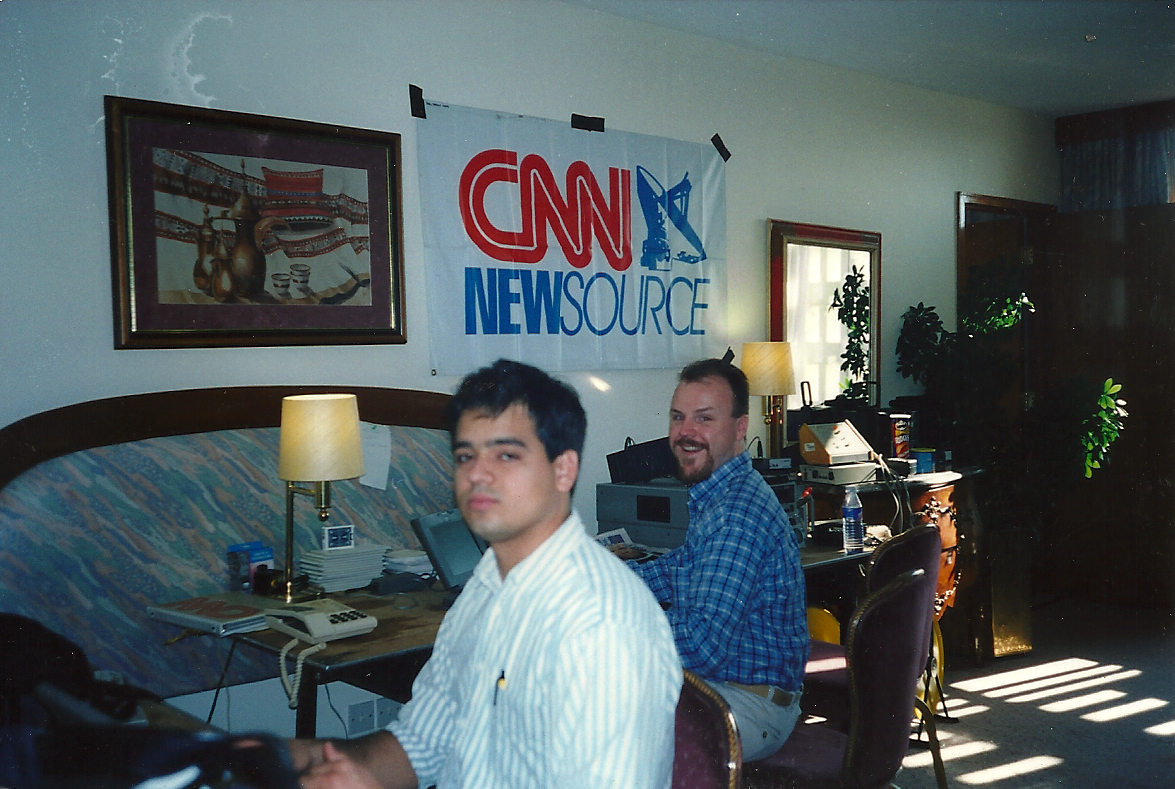Media Operator

Working out of the CNN News Source desk in Jordan, 2001
I’ve always considered myself first and foremost a newsman. I began my career in broadcast journalism, always more inclined towards the editorial hustle than the glare of the spotlight. This naturally led me to media management, where I progressed from assignment editor to production manager, eventually overseeing entire broadcast operations.
I cut my teeth as a broadcast journalist in the 1990s, the nascent days of 24-hour news networks broadcasting in Spanish from the US to the region. I started at Canal de Noticias NBC and later joined the team that launched CNN En Español. This experience was fundamental when, in 2006, I led the launch of the regional news network Telesur. To establish an international news station from scratch, and with limited resources, was no small feat. Yet our work stood out right from the start. Our coverage of such news events as the military coup in Honduras and the FARC hostage releases in Colombia, set our coverage apart as a voice for the Global South, specially in Latin America. I can say without fear of exageration that Telesur has been one of the most impactful media iniatives of the last decades in Latin America.
This initial stage in my career would become very handy to tackle the intricate challenges I’d later face as the president of Venezuela’s public television network, VTV. Steering VTV was unique, especially during an era defined by acute political polarization and two failed coup attempts in 2002—one military and another orchestrated by the oil sector. The editorial hurdles were unlike anything in conventional media management. VTV served less as a neutral news outlet and more as a necessary counterbalance in a media landscape where private entities were active participants in both failed coup attempts. Managing VTV was a complex challenge that extended far beyond the strictly editorial. The position demanded a creative multi-layered approach, were both operational and editorial oversight for a workforce of over a thousand people were very demanding.
My unorthodox career path has included roles from assignment editor for global media outlets to production manager for a national broadcaster, and eventually, leadership positions at VTV and Telesur. Throughout this journey, I’ve managed the demands of the cultural and technological transition from analog to digital; which was not merely a technological update but a whole new set of tools that demanded adaptation. This called for implementing new efficient workflows, reporting systems, and revamped operations to leverage the gains from technological progress. All these shifts needed to stay invisible to our audience, which required not just technical skills but also the leadership capable of keeping the teams rowing in coordination through the evolving media landscapes.
I’ve consistently aimed for expanding our audience and creating meaningful impact through my work in media. My unwavering focus has been on achieving robust viewership figures, built on high-quality production and effective storytelling. In the current attention-driven environment, these elements are more critical than ever for success. The technological and organizational updates I’ve overseen all aimed to better serve and grow our audience. Grounded in innovation and quality journalism, we accomplished building Telesur as the first all digital news broadcaster in Latin America, and upgraded VTV’s production and transmission capacities to HD levels.
My media years were immensely fulfilling for me on a professional level. Along the way, I’ve had to make difficult choices that have had a significant impact on my career, including forcing me into political exile as my country slid into autocracy—a very difficult situation. Regardless, this journey has made me a better professional and a wiser person. Although I have ventured far from my roots in journalism, my commitment to the craft endures. My profesional career began in a newsroom, a space I would like to return to one day.
